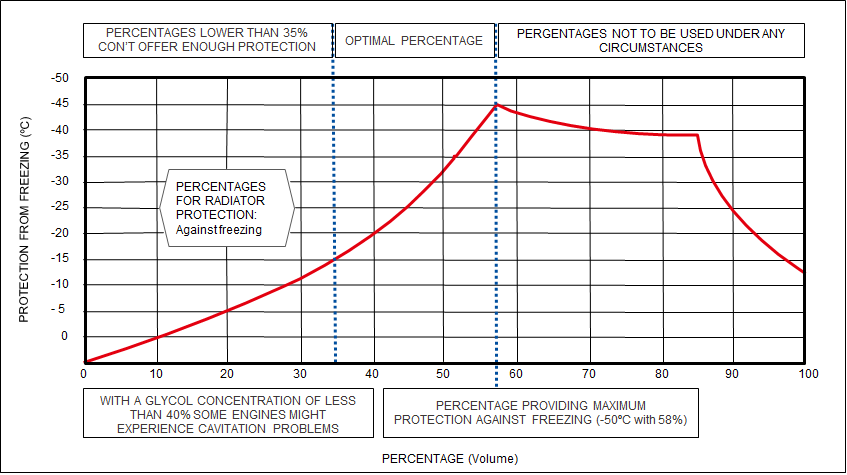Coolants
Only about a third of the energy stored in the fuel is made available as drive power. The remaining energy is released into the environment unused, in the form of heat. Of this remaining energy, around half takes the form of exhaust gases, while the other half is temporarily stored in the engine and its components (cylinder liners, cylinder head, etc.). As the engine and its components can only release this comparatively high quantity of heat into the environment very slowly, additional heat dissipation in the form of engine cooling is an absolute necessity in order to prevent damage to the engine through overheating.
Automotive coolants are fluids designed to remove heat or thermal energy from the combustion engine. These coolants are formulated basically by basic fluids and additives. However, in this case base oils and additives are different from the ones use to formulate engine oils for example.
Basic Fluid
The main representatives are glycol and propylene-glycol.
Undiluted glycol offers only inadequate frost protection, as the freezing point is approximately -16°C. Paradoxically, the freezing point becomes significantly lower through the addition of water, so that frost protection with a glycol / water mixture can be guaranteed down to approximately -55°C.
In addition, if used undiluted, the basic fluid reduces heat transfer as the specific thermal capacity of glycol at approximately 2.4 kJ / (kg*K) is only around half that of water. The same applies to glycol/water mixtures with a high glycol share. Engine developers must take this into account when designing the cooling system.

Additives
Additives are all other substances contained in the coolant, which are not the basic fluid or water. They are almost exclusively used to fulfill all requirements made of coolants other than antifreeze protection.
- Corrosion inhibitors: either form a “protective layer” on the respective materials or are involved as neutralizer in chemical processes in the coolant. This allows them to protect components against destruction.
- pH buffer: stabilize the pH value of the coolant in the alkaline range. They neutralize acids, which can occur during the operating interval in order to prevent damage.
- Complex formers: bind / dissolve mineral deposits and hold them in suspension, thus ensuring clean surfaces and a good exchange of heat.
- Detergents/tensides: ensure good wetting of the surfaces in the cooling circuit and thus guarantee optimal heat transfer to the cooling medium.
- Phosphates: are the salts of ortho-phosphoric acid among other things. They can make compounds with heavy metals, which are used commercially for corrosion protection. Modern coolants do not require the use of phosphates.
- SCA – Supplemental Coolant Additive: is a special additive for coolants. Many American manufacturers required this to improve the corrosion protection.
- Bitter substances: Bitter substances are used to make products safer or less palatable.
Additive technologies
| Traditional | Hybrid | OAT | Si-OAT | HDD | |
|---|---|---|---|---|---|
| Silicates | +++ | +++ | ++ | ||
| Borates | + | + | |||
| Nitrite | +++ | +++ | |||
| Phosphates | + | ||||
| Molybdate | + | ||||
| Organic acids | +++ | +++ | + | ||
| Inorganic acids | +++ | +++ | |||
| FUCHS PRODUCT | FRICOFIN | FRICOFIN LL | FRICOFIN V | FRICOFIN HDD | |
| FRICOFIN DP |
+++ main components / + also included
